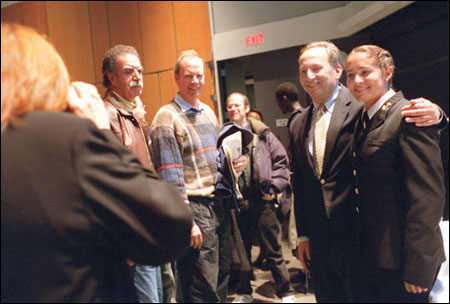Summers addresses parents of first-years
Talks globalization, curriculum review, study abroad

Harvard University and its most valuable resource – its faculty – exist for its students, President Lawrence H. Summers told the parents of freshmen on Friday (Oct. 24), the opening day of Freshman Parents’ Weekend.
“Your children should feel entirely free to visit any member of the faculty, to pursue any area of their interest. You do not have to have a good reason or a smart question to go to a Harvard faculty member’s office hours,” Summers told the standing-room-only crowd in Science Center B. Then, as if to punctuate his point, Summers made himself available for nearly 30 minutes of questions from parents. About issues ranging from changes to the curriculum to the mechanics of paying out Harvard’s endowment, the questions were all smart, as well as challenging.
“Answering parent questions is a lot easier before their students are at Harvard,” the president said when someone asked why Harvard had no student center.
President as teacher
Summers’ brief remarks focused on the contributions members of the class of ’07 have made in their first six weeks on campus, whether to arts organizations, athletics, the Crimson, or academics. He drew from personal experience to discuss the latter: Summers is teaching a Freshman Seminar, “Globalization: Opportunities and Challenges,” which he called a “remarkable class.” The 16 students – expanded from 12 due to overwhelming demand – tap Summers’ experience in global economics to grapple with what he calls one of the pre-eminent challenges of our time.
“The coming together of rich countries and poor countries … brings with it staggering potential for human betterment, but as words like ‘Iraq,’ ‘AIDS,’ and ‘genocide’ suggest, also carries with it enormous challenges and risks,” he said. Examining globalization from moral as well as economic and analytical perspectives, his students discuss a variety of issues including some close to home: Several years ago, the Harvard Crimson hired a company to archive its contents online that in turn paid Cambodian workers $4 per day to keypunch the material.
“Was that immoral exploitation or was that positive progress in globalization or was it somewhere in between?” Summers queried. “What I felt was most important about the discussion was not any conclusion, but that a number of people had a different view after an hour of discussion than they may have had beforehand. That’s what education is all about.”
One parent asked if the popularity of “Globalization: Opportunities and Challenges” didn’t merit its expansion to a regular course in the curriculum. Acknowledging that “there’s certainly a large demand in this area,” Summers was noncommittal about increasing his course load. He did, however, outline his plans to visit Annenberg Hall and invite students there to discuss the subject over lunch or dinner with him.
Parents, many of whom had remained in the Science Center from a previous panel on teaching moderated by Dean of Harvard College Benedict Gross, probed a number of issues specific to teaching and curriculum. Crediting Gross for his capable leadership of the undergraduate curricular review, Summers fielded questions about flexibility in the Core Curriculum and the popularity of Freshman Seminars – three times as many are being offered this year as three years ago, but they must continue to increase if they are to meet demand.
The curricular review Gross is overseeing, however, points to even farther-reaching changes in the future. “We’re thinking through both the structure of the basic undergraduate requirements, the structure of concentrations, and also what I think are a very important set of issues having to do with ways in which you teach,” Summers said. He envisions a shift to more active learning, from laboratory work to the case method of study.
Summers also highlighted significant gains made in enhancing students’ experiences abroad, assuring a concerned parent that students’ re-entry to Harvard, while not always seamless, is substantially improved and will continue to be made easier. He encouraged the parents to consider the increasing number of students who are going abroad in the summer, either for classroom or work experience, in addition to the growing number who are studying abroad during the school term.
“They are coming back with really quite changed perspectives,” he said of the students who’ve returned from summer experiences abroad.
A tough, respectful crowd
Parents were respectful and thoughtful but demanding in their questions of the Harvard president. How, one asked to laughs, is the University’s famously large endowment distributed? “Frugally and cautiously,” Summers quipped before going on to provide a lucid explanation of the complex financial and leadership decisions that play in the payout of the endowment. A very small percentage of the endowment is unrestricted, he said, and the University must use that to fund a variety of new initiatives. Among the current projects vying for endowment money are the expansion of the faculty to increase faculty-student contact and the development of timely new areas of study such as computational biology or Islamic studies.
“It takes guts to take uncensored questions from an audience like this,” said Diane Payne of Concord, Mass., mother of Will Payne ’07, as Summers lingered to greet parents individually after his talk.
Her husband, Steve Payne, was similarly impressed. “I think he’s a bright and dynamic guy,” he said. “I know my children won’t be allowed to be complacent with a guy like him,” he added.




